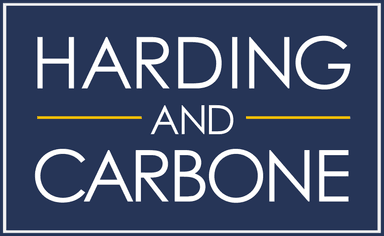Writing A Property Tax Appeal Letter: A Homeowner’s Guide
October 13, 2025

Key Takeaways:
- Eligibility: Filing rights: Homeowners in Texas have the legal right to protest and appeal their property tax assessments under the Texas Property Tax Code.
- Letter Content: What to include: A strong appeal letter should include specific property details, reasons for dispute, supporting evidence, and a suggested corrected value.
- Professional Help: When to seek it: Getting help from experienced firms like Harding & Carbone can be valuable in complex cases or when previous appeals were unsuccessful.
Property taxes are a reality for every Texas homeowner, but the assessment you receive from your county appraisal district isn’t always accurate. Mistakes in square footage, market data, or even overlooked property damage can lead to an inflated value, which means paying more than your fair share in taxes. Fortunately, the Texas Property Tax Code gives homeowners the right to appeal these assessments. Knowing how to write a clear, well-supported property tax appeal letter can help correct an unfair valuation and reduce your tax liability.
At Harding & Carbone, we’ve spent more than 50 years representing property owners throughout Texas. Our firm has handled billions of dollars in property valuations, from single-family homes to large commercial portfolios. With a deep understanding of local markets and the Texas Property Tax Code, we help clients challenge assessments effectively and confidently.
Understanding The Texas Property Tax Code
For Texas homeowners, understanding how property taxes work is key to knowing when and how to appeal an assessment. The Texas Property Tax Code outlines the framework for how properties are appraised, how tax rates are set, and the rights homeowners have when disputing an assessment.
The code requires county appraisal districts (CADs) to assess properties at their market value as of January 1st of each year. These values are used to calculate how much tax you owe. However, errors can happen and a property might be overvalued compared to similar homes in your area, or recent improvements may have been incorrectly factored into the valuation.
The Texas Property Tax Code also gives you the right to protest your valuation and request a hearing with your local Appraisal Review Board (ARB). This is where your appeal letter becomes important. A well-drafted letter, backed by evidence, can be the first step toward lowering your property tax burden.
If you’re unsure how the code applies to your specific situation, consulting professionals who specialize in the Texas Property Tax Code can help. Harding & Carbone has worked with property owners across the state for decades and can help you navigate the appeal process with clarity.
Why You Might Need To Appeal Your Property Tax Assessment
Receiving your annual property tax assessment can be frustrating, especially if the value seems too high. In many cases, homeowners choose to appeal because they believe the assessed value does not accurately reflect the market value of their property.
There are several reasons this might happen. Comparable properties in your neighborhood may be valued lower. The appraisal district might have outdated or incorrect information about your home, such as the square footage or condition. In some cases, recent repairs or damage may not have been factored into the assessment.
Appealing gives you a chance to present evidence that supports a more accurate valuation. This isn’t just about reducing your tax bill. It’s about ensuring fairness. If you’re paying more than your neighbors for a similarly valued home, an appeal helps correct that imbalance.
Working with a team that knows the process inside and out can make a difference. Harding & Carbone specializes in helping property owners identify discrepancies and prepare a strong case for appeal. Their experience across Texas gives homeowners a reliable resource during the process.
What To Include In A Property Tax Appeal Letter
Your appeal letter is your first opportunity to clearly explain why your property’s assessed value should be reviewed. A focused and well-organized letter can make a strong impression on the Appraisal Review Board and set the tone for the rest of the appeal process. Here are the key components to include:
Property Identification Details
Start by including your full name, property address, and account or parcel number. This information helps the appraisal district quickly locate your records and ensures your appeal is tied to the correct property.
Statement Of Intent To Appeal
Clearly state that you are appealing your property tax assessment and identify the tax year in question. This can be as simple as: “I am writing to formally appeal the 2025 assessed value of my property.”
Reason For The Appeal
Explain why you believe the assessed value is inaccurate. This could be due to incorrect property data, comparable home values, recent property damage, or a decline in market conditions. Be specific, but concise.
Supporting Evidence
Attach relevant documentation such as recent photos, repair estimates, sales data from similar properties, or an independent appraisal. If you’re unsure which documents will be most effective, Harding & Carbone can help you identify and organize the evidence that supports your case.

A Clear Request
State what you believe the correct value of your property should be and ask for a reassessment based on that figure. This shows that you’ve done your research and aren’t just disputing the value without reason.
Contact Information
Include your phone number, email, and mailing address in case the appraisal district needs to follow up with questions or schedule a hearing.
How To Structure Your Appeal Letter
A clear and professional structure helps your appeal letter stand out. Organizing your points logically makes it easier for the Appraisal Review Board to understand your position and consider your evidence properly. Here’s a simple structure to follow:
Introduction
Begin with a brief opening that states your intent to appeal the property tax assessment for the current year. Include your property address, account number, and any identifying details the appraisal district may require.
Explanation Of Dispute
Use this section to explain why you believe the assessed value is incorrect. Reference specific issues such as inaccurate property details, declining market value, or recent damage that affects the property’s worth.
Evidence Summary
List the documents you’re including with the appeal. Mention sales data, repair estimates, appraisals, or photographs, and briefly explain how each supports your request for reassessment. For guidance on what type of documentation holds the most weight with local review boards, Harding & Carbone can help ensure your appeal package is well-prepared and complete.
Proposed Value
Clearly state the value you believe more accurately reflects your property’s market worth. Base this figure on your evidence rather than an arbitrary amount, which helps show that your request is reasonable and informed.

Closing Statement
Finish with a respectful request for review and reconsideration. Thank the board for their time and offer your availability for further questions or a scheduled hearing.
Common Mistakes To Avoid An Appeal Letters
A strong appeal letter can support your case, but simple mistakes can weaken your argument or delay the review process. Avoiding these common missteps can improve the chances of your appeal being taken seriously:
Being Too Vague
General complaints like “my taxes are too high” won’t help your case. Your letter should explain why the value is incorrect using specific details and supporting information.
Leaving Out Documentation
Your letter should always be backed by evidence. Submitting your appeal without data such as comparable sales, repair estimates, or photos makes it harder for the review board to justify a change.
Using An Aggressive Or Emotional Tone
While frustration is understandable, the letter should remain respectful and professional. A calm, factual tone is more effective than one that sounds angry or accusatory.
Failing To Suggest A New Value
Don’t leave it up to the board to guess what you think your property is worth. Offer a reasonable proposed value based on your research and supporting documents.
Missing Deadlines Or Requirements
Every county has its own filing deadlines and formatting rules. If you’re unsure about the process in your area, Harding & Carbone can help you stay on track and avoid procedural errors that could delay or dismiss your appeal.
What Happens After You Submit Your Appeal
Once your appeal letter is submitted, the process doesn’t end there. Understanding what to expect next can help you stay prepared and respond appropriately as your case moves forward:
Acknowledgment From The Appraisal District
After you file your appeal, you should receive a confirmation from your county’s appraisal district. This will typically include details about the next steps, such as deadlines or hearing schedules.
Review By The Appraisal Review Board (ARB)
Your appeal will be reviewed by the ARB, an independent panel that hears disputes between property owners and appraisal districts. They will examine your letter, supporting documents, and the information provided by the district.
Hearing Notification
If your case moves to a formal hearing, you’ll receive notice with the date, time, and location. During the hearing, both you and the district’s representative will have the opportunity to present your evidence.
Final Decision
The ARB will issue a decision after reviewing the evidence. If the board agrees with your argument, your assessed value will be adjusted. If not, you may have the option to pursue further remedies through binding arbitration or court.
When To Get Professional Help With Your Property Tax Appeal
While many homeowners file appeals on their own, there are situations where working with a property tax consultant can make a real difference. If your case involves complex valuation issues, commercial property, or significant documentation, a professional can help streamline the process and improve your chances of a favorable outcome:
Limited Time Or Experience
If you’re unfamiliar with how property tax appeals work or simply don’t have time to research, organize evidence, and meet filing deadlines, partnering with an experienced firm can save both time and stress. Harding & Carbone works with property owners across Texas and can manage the process from start to finish.

Complex Or High-Value Properties
Homes with unique features or commercial properties often require more technical evaluations. Professionals have access to data and appraisal tools that can strengthen your appeal and present a well-supported case.
Previous Appeals Denied
If you’ve appealed in the past without success, it may be time to bring in a consultant. They can assess what went wrong and help you approach the process with a new strategy and stronger documentation.
Final Thoughts
Challenging a property tax assessment might seem overwhelming at first, but with the right approach, it can be a manageable and worthwhile effort. A well-written appeal letter, supported by accurate information and clear reasoning, gives you the opportunity to correct an unfair valuation and possibly reduce your tax bill.
For Texas homeowners, understanding your rights under the Texas Property Tax Code is the first step. If you’re unsure how to begin or want support throughout the process, Harding & Carbone offers guidance backed by decades of experience in Texas property tax appeals.
Read Also:
- How To Manage Property Taxes In Harris County
- Fort Bend County Taxes: Essential Facts And Payment Steps
- Property Tax Advice For Montgomery County Homeowners
Frequently Asked Questions About Writing A Property Tax Appeal Letter
What is the Texas Property Tax Code and where can I find it?
The Texas Property Tax Code is a set of laws that govern how property taxes are assessed and administered across the state. You can find it through the Texas Constitution and Statutes website or by contacting your local appraisal district.
Can I appeal my property tax if I missed the official deadline?
In most cases, missing the deadline means you’ll have to wait until the following tax year. However, exceptions exist if there were clerical errors or specific legal grounds. Check with your local appraisal district for any qualifying circumstances.
Is there a fee to file a property tax appeal in Texas?
Filing a protest with the Appraisal Review Board is typically free for residential property owners. Fees may apply if you choose to pursue arbitration or legal action after the board’s decision.
Does Texas offer property tax relief programs?
Yes. Texas offers exemptions such as homestead, disabled veteran, and over-65 exemptions that can lower your taxable value. These must be applied for separately and have specific eligibility requirements.
Can I appeal if I recently bought my home at a lower price than the assessed value?
Yes. If your recent purchase price is lower than the assessed value, that sale can be used as strong evidence to support your appeal.
How long does it take to get a decision after submitting an appeal?
It varies by county, but most Appraisal Review Boards issue a decision within a few weeks to a couple of months after your hearing or submission.
Will appealing my taxes trigger a reassessment that could raise my value?
It’s possible, but not common for residential properties. Most appraisal districts focus only on correcting the specific issues raised in the appeal.
Can someone else attend my property tax appeal hearing on my behalf?
Yes. You can authorize a tax consultant, attorney, or other representative to attend the hearing for you. Written authorization is usually required.
Do property tax appeals affect future valuations?
Not directly. Each year’s valuation is treated independently, though past appeals and adjustments may be noted in your file.
What role do tax consultants like Harding & Carbone play in the appeal process?
They help gather data, prepare evidence, and represent property owners in front of appraisal boards. Their expertise can be especially helpful for complex or high-value properties.
